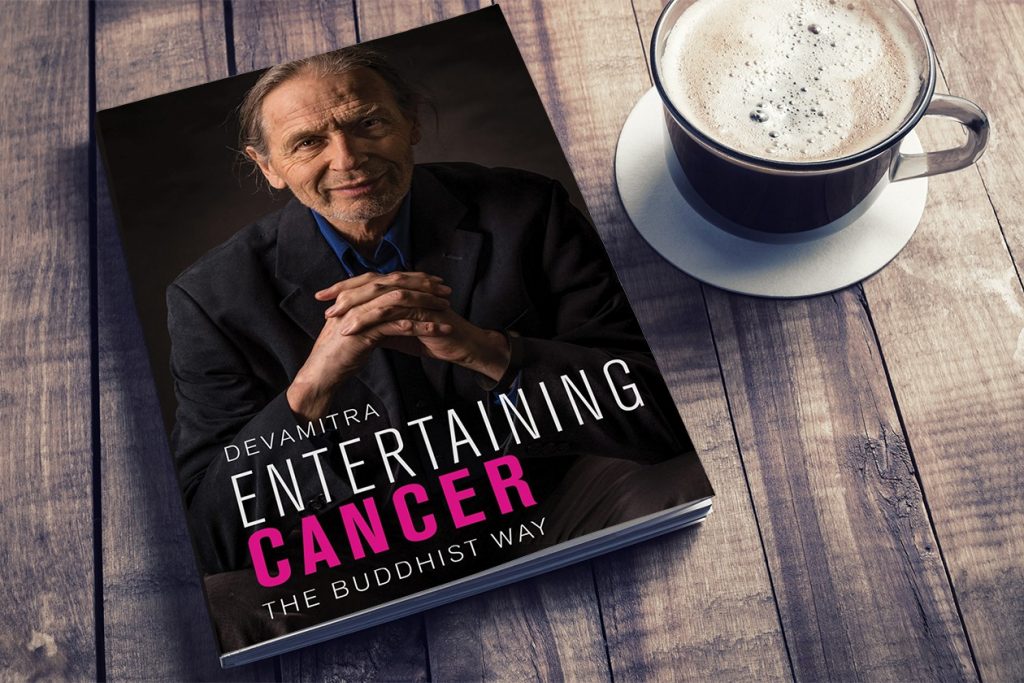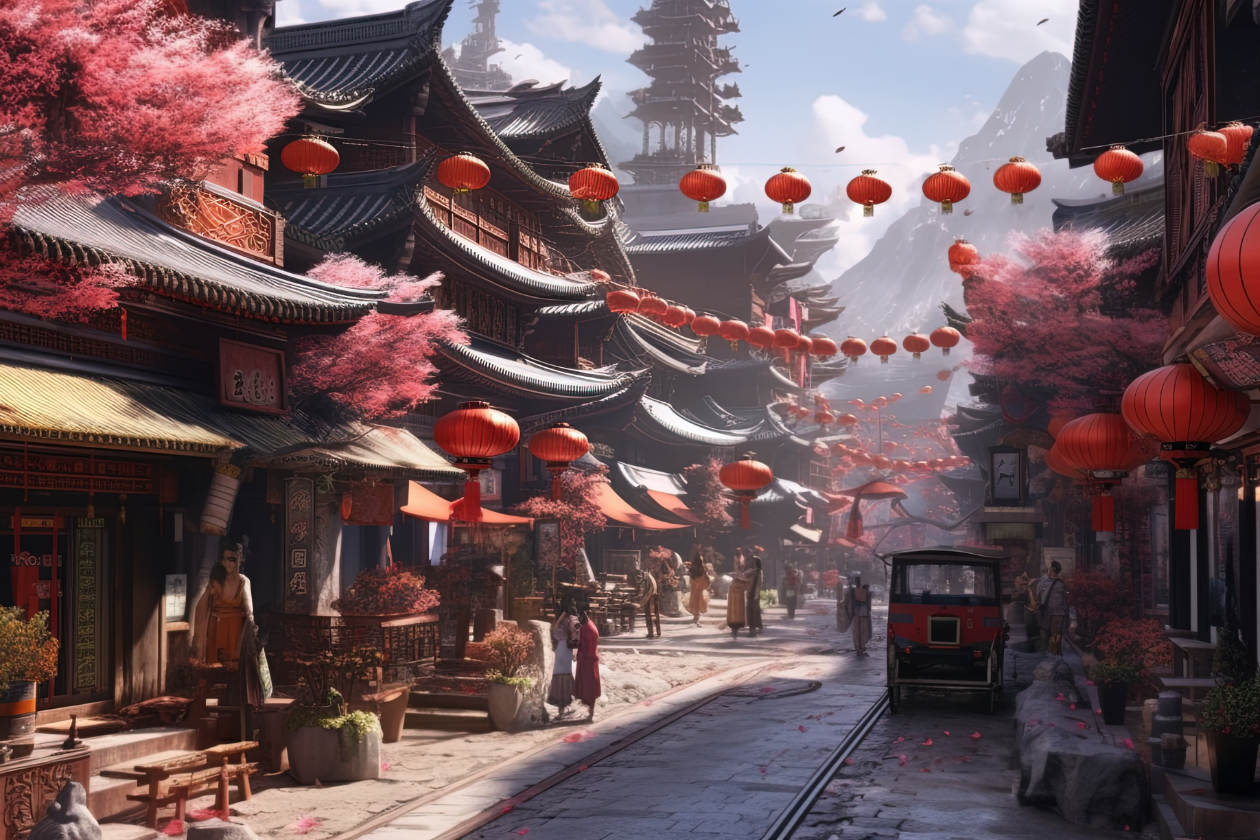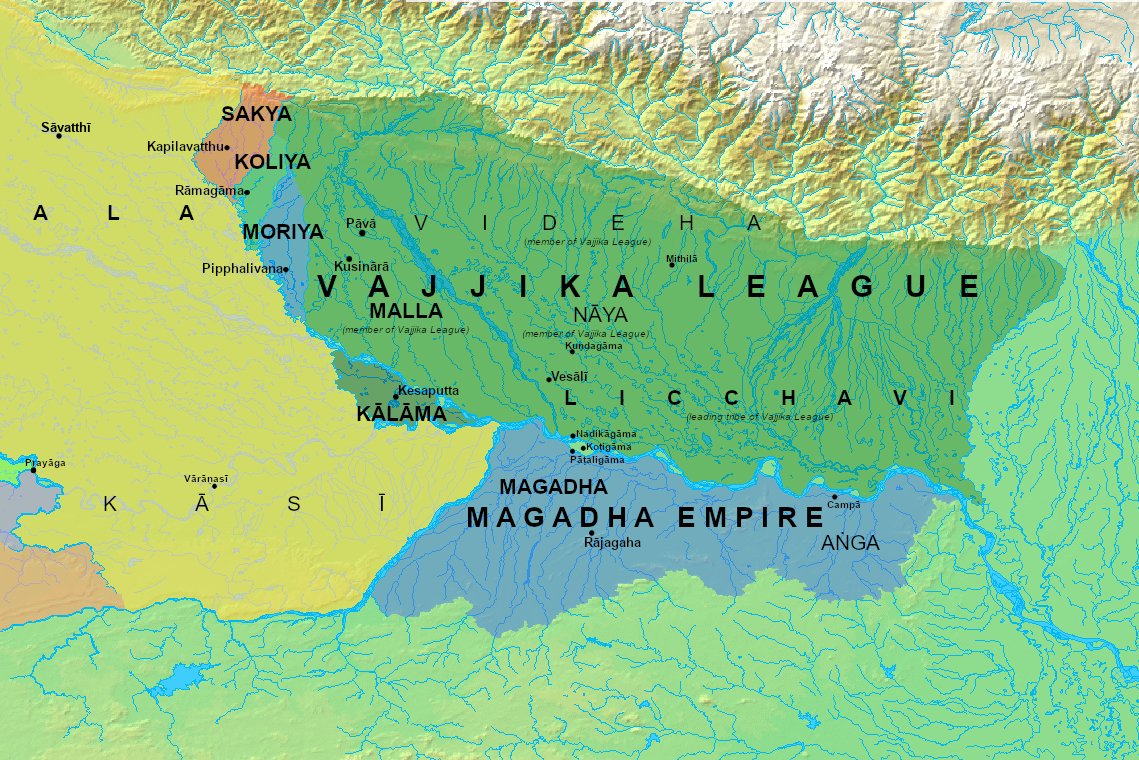Book Review: ‘Entertaining Cancer – The Buddhist Way’ by Devamitra, Windhorse Publications.
In this fascinating book, Devamitra describes his experience of being diagnosed with prostate cancer at the age of 68, the very unpleasant and exhausting treatment he had to undergo to save his life, and then the aftermath. Once he had his diagnosis Devamitra began to write about his experiences in an attempt to “objectify” what was happening to him, and this book is the result of that writing: it’s a description of how a Buddhist of 45 years training dealt with a very serious, life-threatening illness.
There is a sutta in which an old, frail and ill man asks the Buddha to give him a teaching relevant to his condition. The Buddha tells him he should train in the following way: ‘Even though I may be afflicted in body, my mind will not be afflicted.’ 1 Such a simple teaching. Easier said than done of course. Devamitra shows how he put that into practice, and it’s an object lesson in practising the Dharma in adversity.
The title of the book expresses something of his attitude throughout. It’s not My Battle with Cancer, or How I Fought Cancer and Won, which are expressions of the popular metaphor for cancer, but Entertaining Cancer. There are a number of ways of interpreting this, but one way – perhaps the most important one – is that Devamitra didn’t regard cancer as his enemy but as a guest. An unwelcome one of course, but one that, if treated with respect, could teach him precious lessons about life and death. If there was a battle it wasn’t with cancer but with his mind: “What I feared most was not death or pain but loss of mental equilibrium”.
Another way of interpreting the title is that cancer and its treatment are, in some ways, entertaining. Devamitra is a very good writer and I was drawn into his life, his ‘journey’ (to use another metaphor), as I often am when reading a novel. It’s also very funny in places, although the humour never feels forced, never feels as if it were a desperate attempt to ‘keep his chin up’. In fact one surprising result of his experience was a keener sense of humour. He tells us that as the chemotherapy proceeded he found himself increasingly prone to laughter, and he wondered why that was. And why had he never noticed before that life is such a comedy?
Probably because of the cancer, I saw and felt the tragedy and comedy of my own life with increasing sharpness; the one reminds me of the seriousness of the human predicament, the other lightens its burden; unified in their transcendent beauty, they can give rise to wisdom and compassion when keenly observed.
A more negative dichotomy Devamitra had to work with was ‘the terrible twins’ hope and fear. When a well-wishing friend says ‘crossed fingers’ for his recovery, Devamitra, although appreciating the kindly sentiment, wants none of it. One of his spiritual heroes – the great Tibetan yogi Milarepa – persistently warned against falling prey to them, and Devamitra was determined not to do so. He wanted to face what was happening directly, just as it was, with no hopes or fears. Whether he died or lived was of secondary importance. The most important factor was his state of mind.
Another interesting theme is the heightened sense of beauty he experienced during his treatment, beauty that, he says, is often hidden from us. One day a friend visited him and commented on the “uninspiring view” out of the window. Later, recalling this comment while lying on his back, looking out of that same window, he writes
“I could see nothing but infinite blue sky, white clouds drifting across.… I sat up and looked again. The outlook was far from beautiful, but I had gazed at it for countless hours and had found beauty within it nonetheless – and beauty is always a source of inspiration to me; many times, it had touched me – especially when housebound and I had nothing else to look at.”
His explanation for this discovery of beauty in what is usually considered ugly, or at least plain, was due to a deep relaxation, a loosening, sometimes a letting go, of his ‘clinging to self’. Perhaps this also explains his new found awareness of the comedy of life, and also his occasional feelings of a deep happiness – in fact he tells us that there were times when he had never felt happier.
We also meet a number of other people treading the same path as Devamitra, some of them ‘bearing their burden’ bitterly, some of them falling into depression, but others – perhaps the majority he thinks – were optimistic, and there was an abundance of mutual well-wishing. He says that facing cancer had a ‘humanizing’ effect on many of his fellow patients. One of these is Jean, an actress who, although suffering from metastatic lung cancer, “was so bright and genuinely cheerful, despite her evident pain”. One day she remarked “When you get something like this it shifts your perspective on life”. Devamitra comments
She clearly meant for the better, as her ready smile demonstrated.The last time I saw her shrunken form, she wished me well; then, “maybe we’ll meet again”, she said, “but with this, you don’t even know if you’ll be here next week.” I’ll never forget those words, nor the sweetness of their accompanying smile.
Another theme of the book is appreciation and gratitude – for the men he lived with who supported him throughout, his wider circle of friends, his Buddhist teacher, and all the health professionals who had a hand in his treatment and recovery. This aspect of the book is very inspiring, and there were times when I was moved by both the kindness he received and his gratitude for those who gave it.
Towards the end of the book, his treatment over, he says that he almost regretted the change.
For all the terrible discomforts of chemo and radiotherapy, and their uncertain outcome, they had been accompanied by heightened awareness and an underlying exhilaration. My life had seemed a thing of gossamer at the mercy of shifting winds – as, actually, it always is – but I was constantly reminded of that, and, though at times I forgot, I could not do so for long.
One of Devamitra’s motives in writing this book was to be of benefit to others facing cancer – or any illness – and although the subtitle is the Buddhist Way, I don’t think its message is only relevant to Buddhists. I’m sure it would help anyone with cancer, so I hope the subtitle won’t deter them from reading it. I think it will also be of benefit to all practising Buddhists whatever their circumstances. Speaking personally, I was at times inspired and at other times greatly challenged by Devamitra’s determination to face illness and the real possibility of death, with his eyes open and his mind clear. Would I be able to do the same? I hope so.
I will leave you with one last quote from towards the end of the book. Although the treatment was over, he continued to experience its unpleasant effects, one of which was a debilitating weakness in his legs, which he says felt like ‘marble stilts’ when he walked. One day he wanted to visit his beloved Victoria Park, but was not sure whether his legs were up to the task. He decided to risk it, but asked a friend from his community to join him in case he was unable to make it back on his own. By the time they reached the entrance to the park he was exhausted, so they leaned on the parapet of the bridge over the canal and enjoyed the mildness of the late November day.
The light was all but horizontal, catching the lingering yellow on the trees, alchemising it into purest gold: the most poignant moment in autumn – and my most precious – the last few leaves clinging with but the slightest grip to their life source, hanging on to face their fate – a gentle fall to earth, or a taunting flight heavenwards, that they might then be cast down like fallen angels, the choice not theirs to make.



